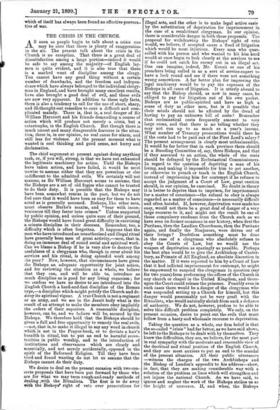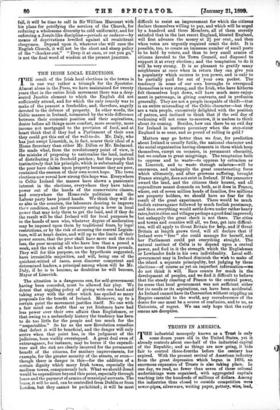THE CRISIS IN THE CHURCH.
AS soon as people begin to talk about a crisis one may be sure that there is plenty of exaggeration in the air. The present talk about the crisis in the Church is no exception. That there is a, great deal of dissatisfaction among a large portion—indeed it would be safe to say among the majority—of English lay- men is quite evident, and it is also true that there is a marked want of discipline among the clergy. You cannot have any good thing without a certain number of drawbacks, and the freedom and indepen- deuce which have always belonged to the individual clergy- man in England, and have brought many excellent results, have also brought a good deal of evil, and these evils are now very apparent. In addition to these ugly facts, there is also a tendency to call for the use of short, sharp, and ill-thought-out remedies to cure a difficult and com- plicated malady. There is, that is, a real danger of Sir William Harcourt and his friends demanding a course of action which will produce not merely a crisis, but a catastrophe, in the English Church. But though there is much unrest and many disagreeable features in the situa- tion, there is, in our opinion, no real cause for alarm, and still less for violence. At the present moment what is wanted is cool thinking and good sense, not hurry and declamation.
The chief argument at present against doing anything rash, or, if you will, strong, is that we have not exhausted the legitimate machinery for action. Until the Bishops have taken action, and have failed, it would be most unwise to assume either that they are powerless or else indifferent to the admitted evils. 'We certainly will not assume, as Sir William Harcourt seems to assume, that the Bishops are a set of old fogies who cannot be trusted to do their duty. It is possible that the Bishops may have been somewhat remiss in the past, but we do not feel sure that it would have been as easy for them to have acted as is generally assumed. Bishops, like other men, must observe Burke's maxim, and "bear with incon- veniences till they fester into crimes." Unless supported by public opinion, and unless quite sure of their ground, the Bishops would have found great difficulty in exercising a, minute discipline in their dioceses. Remember, too, a difficulty which is often forgotten. It happens that the men who have introduced an unauthorised and illegal ritual have generally been men of great activity,—men, that is, doing an immense deal of sound social and spiritual work. Can we blame a Bishop if he is very slow to destroy the usefulness of a clergyman who, though in error about his services and his ritual, is doing splendid work among the poor ? Now, however, that circumstances have given the Bishops an adequate opportunity for joint action, and for reviewing the situation as a whole, we believe that they can, and will be able to, introduce as much discipline as is good for any living organism ; for we confess we have no desire to see introduced into the English Church a hard-and-fast discipline of the Roman type,—a discipline which •might petrify the Church and de- stroy its spiritual vigour. A true Church is not a regiment or an army, and we see in the Jesuit body what is the result of an attempt to make the members obey implicitly the orders of their superiors. A reasonable discipline, however, can be, and we believe will be, secured by the Bishops. We therefore hold that the Bishops should be given a full and free opportunity to remedy the real evils, —not, that is, to make it illegal to say any word in church which is not in the Prayer-book, or to deviate a hair's breadth in ritual, but to put an end to harmful eccen- tricities in public worship, and to the introduction of institutions and observances which are clearly and essentially, and not merely accidentally, opposed to the spirit of the Reformed Religion. Till they have been tried and found wanting do net let us assume that the Bishops cannot do their duty.
We desire to deal on the present occasion with two con- crete proposals that have been put forward by those who are for what we may term rough-and-ready methods of dealing ,with the Ritualists. The first is to do away with the Bishops' right of veto over prosecutions for illegal acts, and the other is to make legal action easie by the substitution of deprivation for imprisonment in the case of a recalcitrant clergyman. In our opinion, there is considerable danger in both these proposals. The proposal for withdrawing the Bishops' right of veto would, we believe, if accepted cause a flood of litigation which would be most injurious. Every man who quar- relled with his parson and who wanted to hit him bard would at once begin to look closely at the services to see if he could not catch his enemy out in an illegal act. One can imagine, indeed, Mr. Kensit or one of his preachers being called in as a sort of service-expert to have a look round and see if there were not something wrong somewhere. A far better plan for improving the legal machinery would be to pay the expenses of the Bishops in all cases of litigation. It is utterly absurd to say that the Bishop should, as now in many cases, be obliged to pay for litigation out of his own pocket. Bishops are as public-spirited and have as high a, sense of duty as other men, but is it possible that their minds should not be affected by the dread of having to pay an unknown bill of costs ? Remember that ecclesiastical costs frequently amount to very large sums, and that there is no telling whether they may not run up to as much as a year's income. What number of Treasury prosecutions would there be if the costs had to be paid out of the First Lord's salary ? The present arrangement is clearly most unbusinesslike. It would be far better that in each province there should be a Standing Committee of, say, three Bishops, and that if they assented to an action, the whole of the costs should be defrayed by the Ecclesiastical Commissioners. In regard to the question of depriving a man of his living, and making it impossible for him to get another, or otherwise to preach or teach in the English Church, instead of imprisoning him for contempt if he refuses to accept the judgment of a Court of Law, great caution should, in our opinion, be exercised. No doubt in theory it is better to deprive than to imprison, for imprisonment for a matter of conscience—the refusal to obey is always regarded as a matter of conscience—is necessarily difficult and often hateful. If, however, deprivation were made too easy, would not there be a great deal of danger of a very large recourse to it, and might not the result be one of those compulsory exoduses from the Church such as we have seen on former occasions in our history, when first the Puritans, then the Laudian Churchmen, then the Puritans again, and finally the Nonjurors, were driven out of their livings ? Doubtless something must be done in the case of a clergyman who absolutely refuses to obey the Courts of Law, but we would use the weapon of deprivation as sparingly as possible. Perhaps the best plan would be to give the Archbishop of Canter- bury, as Primate of All England, an absolute discretion in the matter. If it were reported to him by a Court of Law that it had inflicted imprisonment for contempt, ho might be empowered to suspend the clergyman in question (say for two years) from performing the offices of the Church in any church or chapel in the United Kingdom, and there- upon the Court could release the prisoner. Possibly even in such cases there would be a danger of the clergyman who was suspended setting up a Church for himself, but this danger would presumably not be very great with the Ritualists, who would naturally shrink from such a defiance of authority. We do not, however, profess to be able to solve this difficult problem completely. We only, on the present occasion, desire to point out the evils that must follow from a hasty and wholesale recourse to deprivation.
Taking the question as a whole, our firm belief is that the so-called " crisis " had far better, as we have said above, be left to the Bishops to be dealt with by themselves. They know the difficulties, they are, we believe, for the most part in real sympathy with the moderate and reasonable view of the doctrinal and ritual position of the English Church, and they are most anxious to put an end to the scandal of the present situation. All their public utterances —witness the charges of the two Archbishops and the Bishop of London's appendix to his address—show, in fact, that they are making considerable way with a solution of the problem on lines which will strengthen and not injure the national Church. As we have said, to ignore and neglect the work of the Bishops strikes us as the height of unreason. If, and when, the Bishops
fail, it will be time to call in Sir William Harcourt with his plans for petrifying the services of the Church, for reducing a wholesome diversity to cold uniformity, and for enforcing a Jesuit-like discipline—perinde ac cadaver—by means of deprivations levelled against all recalcitrant clergymen. Depend upon it, whatever else will cure the English Church, it will not be the short and sharp policy of the " chucker-out." " Drop it at once, or out you go," is not the final word of wisdom at the present juncture.



































 Previous page
Previous page